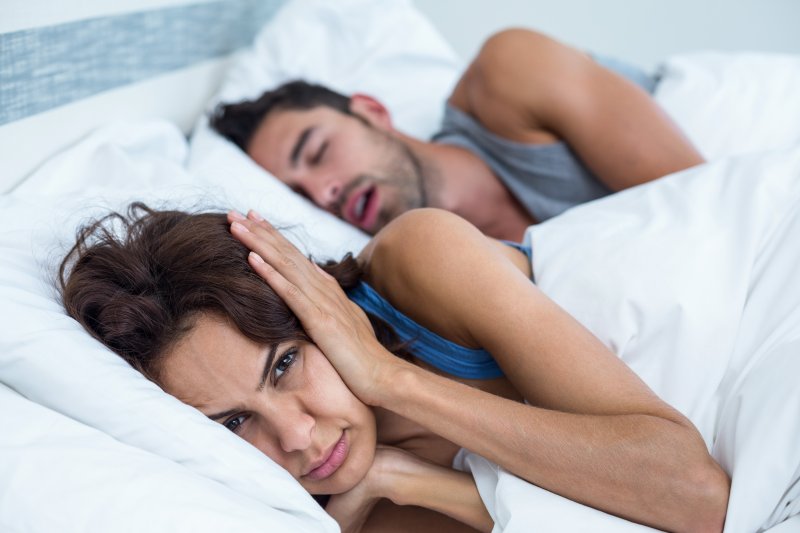
With 40-50% of marriages in America ending in divorce, it’s no wonder that the psychology of marital relationships piques interest. According to one study, with additional data from the INSIDER data team, there are 11 main reasons for divorce, with the first being lack of commitment, the second being infidelity, and the third being excessive conflict and arguing.
One issue that can lead to an abundance of conflict and arguing is one that may be commonly overlooked: snoring. If you or your partner snores frequently, it may be straining your relationship more than you realize. Here’s how.
Impacts of Snoring
Snoring impacts not only the snorer but those in close proximity to the snorer, potentially damaging their sleep quantity and quality and leading to a laundry list of cognitive problems. Nobody wants to be blamed for their partner’s decreased performance at work or a forgotten chore!
In addition, the likelihood of arguments increases due to negative behaviors that develop due to poor sleep. Sleep deprivation can also lead to couples feeling less appreciative of each other because they are less aware of their partner’s needs and mood. Relatively small problems can turn into big fights, with both parties lacking the patience necessary to listen to each other, simply because their brains aren’t getting what they need to recover each day.
Sleep deprivation can also impact sex. One study of people in their early-to-mid sixties found that poor sleep was associated with erectile dysfunction for men and arousal problems and orgasmic difficulty for women.
Any one of these factors can cause a couple to grow apart, and together, they create an incredible burden that is tough to navigate. People simply aren’t at their best when they frequently miss sleep, and snoring definitely doesn’t help the snorer or their partner get the rest they deserve.
An Immediate Solution to Consider
One solution may be sleeping in separate rooms. There are benefits to this, especially if partners have different sleep schedules or vastly different sleep preferences. This method may be particularly helpful for the individual who doesn’t snore.
However, while sleeping in separate rooms may benefit the snorer’s partner, it doesn’t actually address the underlying issue for the snorer. It may also have negative effects on a couple’s emotional and physical bond, so each couple should assess what will work best for their relationship.
Permanent, Long-Term Solutions
Many people don’t know that snoring is the number one sign of an actual sleep disorder called sleep apnea. Obstructive sleep apnea (OSA) is a serious and common condition that causes an individual to temporarily pause breathing multiple times throughout the night. OSA can lead to cardiovascular disease, diabetes, high blood pressure, and a multitude of other health conditions.
Those with sleep apnea should seek professional treatment. By speaking with a general practitioner or sleep physician, sufferers can get ahead of the curve and tackle sleep apnea head-on before it gets worse—and permanently damages close relationships.
OSA Treatment Options
Once someone has been diagnosed with sleep apnea, they have a few treatment options to choose from. The traditional treatment for sleep apnea is CPAP (continuous positive airway pressure) therapy. CPAP is a facial mask connected to a pump that creates a constant flow of oxygen through the throat, keeping the airway open throughout the night. While proven effective, many patients stop using their CPAP machine because it is uncomfortable, loud, and bulky.
Many patients prefer oral appliance therapy. Instead of a bulky machine, patients simply wear a custom-designed mouthpiece (similar to a mouthguard or retainer) to bed that positions their jaw slightly forward, preventing the airway from closing. In addition to stopping sleep apnea, this has the added benefit of preventing snoring. Sleep appliances are quiet, comfortable, and effective, making them ideal for individuals and couples alike.
How to Get Started
In order to begin receiving non-invasive treatment for obstructive sleep apnea, you’ll need to meet with a sleep apnea dentist. Fortunately, you’ll find one right here in Northern Atlanta at Sleep Better Georgia. Dr. Jeff Rodgers has over 20 years of experience treating sleep apnea with oral appliance therapy.For some, snoring is just annoying, but for others, it’s a serious problem. Fortunately, it’s one that can be easily solved, and all you have to do to get started is schedule a free consultation with Dr. Rodgers by clicking here.
